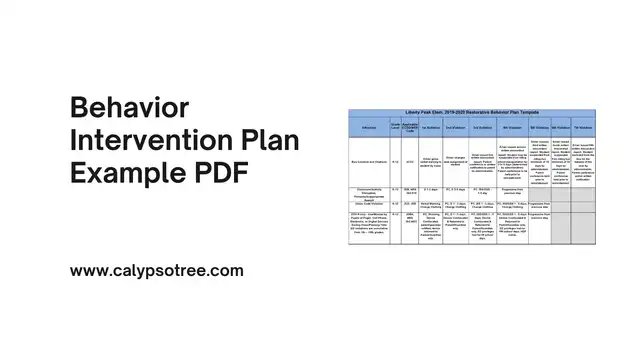Job description for a help desk technician! Help Desk Technicians are crucial in the world of technology. They make sure IT services in a company run smoothly. This article will cover what Help Desk Technicians do, the skills they need, and the path to becoming one. This role is perfect for those looking to enter a fast-paced, essential field in the IT industry.
What a Help Desk Technician Does
Help Desk Technicians play a key role in solving computer-related problems. Here’s what they typically do:
- Answer Questions: They respond to questions about how to use computers, software, and other technology.
- Solve Problems: When something goes wrong, like a software glitch or a hardware malfunction, they figure out the problem and fix it.
- Support Methods: They help people through different ways—over the phone, by email, or face-to-face.
- Quick Response: They work fast to fix issues so that everyone can get back to work without much delay.
Importance in the IT Industry
Help Desk Technicians are crucial in the IT industry for several reasons:
- Key Support: They are often the first people contacted when there’s an IT problem.
- Keeping Systems Running: They ensure that every part of a company’s IT system is working correctly.
- Boosting Productivity: By quickly and effectively solving IT issues, they help everyone in the company stay productive.
- Customer Satisfaction: They also play a big part in making sure users are satisfied with their technology experience.
What skills are required for a Help Desk Technician?
Help Desk Technicians need a wide range of skills to do well in their job. Here’s what they should know:
- Operating Systems: They need to understand different systems like Windows, macOS, and Linux. This helps them fix specific problems quickly.
- Networking: Knowing how to set up and fix network issues is important. This includes understanding how networks work and how to troubleshoot problems.
- Hardware Troubleshooting: They should be able to figure out and fix problems with computers and other devices like printers.
- Software Installation and Configuration: It’s important to know how to set up and manage software so it works well on different computers.
- Security Basics: Knowing the basics of keeping systems safe from viruses and hackers is more important than ever.
Soft skills are just as important because they help technicians work well with others:
- Communication: Being able to explain technical stuff in simple terms is crucial.
- Customer Service: They need to be good at helping users feel understood and supported.
- Problem-solving: They must be able to think through problems and find solutions quickly.
- Time Management: Managing time well is key because they often have to deal with many problems at once.
Educational and Professional Requirements
Here’s what’s usually needed to become a Help Desk Technician:
- Associate Degree: Most jobs require at least a two-year degree in Information Technology, Computer Science, or a similar area.
- Certifications: These can really help a technician stand out:
- CompTIA A+: This is a basic certification that shows you know your way around computers and networks.
- Cisco Certified Network Associate (CCNA): This shows you can handle bigger network tasks.
- Microsoft Certified: Windows 10: Since many places use Windows, this certification proves you can manage Windows systems.
- ITIL Foundation: This is good for understanding how IT services work, especially in big companies.
These skills and qualifications help technicians handle everyday problems and keep up with new technologies in the IT world.
Hardware and Software
Help Desk Technicians use a variety of tools to help them do their job well. Here’s a closer look at what they might use:
- Help Desk Software: This type of software helps technicians manage and keep track of all the requests for help that they get. It can show which problems are still being fixed and which ones are solved.
- Remote Desktop Tools: These tools let technicians take control of a computer from a different place. This is really helpful when they need to fix something on a computer without being right next to it.
- Knowledge of Operating Systems: Technicians need to know how to work with different operating systems like Windows, macOS, and Linux. This helps them fix problems specific to each system.
Latest Trends in Help Desk Technology
Technology in the help desk field is always improving, making the job of a technician easier and more efficient. Here are some of the latest trends:
- Cloud-Based Help Desks: More companies are using cloud-based systems for their help desks. This means the software that technicians use to manage help requests is online, which can make it easier to use and more flexible.
- Artificial Intelligence (AI): AI is starting to be used in help desk tools. It can help by automatically sorting out simple problems so that the technicians can focus on more complex issues. AI can also suggest solutions based on the problems it has seen before.
How does a Help Desk Technician interact with customers?
Interaction with Customers
A big part of a Help Desk Technician’s job is talking and working with customers. This interaction is crucial because how they handle these conversations can really impact a customer’s experience. Here are some key things they do:
- Stay Calm and Professional: No matter how stressed or upset a customer may be, technicians keep their cool. This helps them handle the situation better and keeps things positive.
- Ensure Customer Satisfaction: They make sure to listen to the customer’s problems and work hard to solve them. It’s important that customers feel heard and helped.
Solving Common Issues
Help Desk Technicians deal with many of the same issues regularly, which means they get very good at recognizing and fixing these problems. Some common issues include:
- Lost Passwords: People often forget their passwords. Technicians help them reset passwords quickly so they can get back to work.
- Software Glitches: Sometimes software doesn’t work as it should. Technicians need to figure out what’s wrong and how to fix it.
To solve these problems effectively, technicians need:
- Strong Technical Knowledge: They must understand how different technologies work so they can figure out what the issue is.
- A Good Plan: Having a clear process to follow helps them solve problems faster. This might mean asking certain questions to understand the problem better or using special tools to diagnose the issue.
Every day, Help Desk Technicians use their skills to help people solve technical problems quickly.
Career Development for a Help Desk Technician
Career Pathways
When you start as a Help Desk Technician, you’re at the beginning of a path that can lead to many exciting opportunities.
Here’s how you might move up:
- Gain Experience: The more problems you solve as a Help Desk Technician, the more you learn.
- Learn More: Staying curious and learning more about IT can help you move up.
- Improve Skills: As you get better at managing complex IT systems, you’ll be ready for higher positions that need these skills.
Continuing Education
In the world of technology, things are always changing. New software, tools, and technology updates come out all the time. Here’s what many technicians do to keep their skills sharp and advance their careers:
- Take Courses: Many courses are available online and in person that can teach you the latest in technology.
- Earn Certificates: Getting new certifications can help too.
- Attend Workshops and Seminars: You might learn about the latest trends in IT and how other professionals solve problems.
Challenges and Performance Measurement
Workplace Challenges
Being a Help Desk Technician isn’t always easy. There are a few big challenges they face:
- Fast Problem-Solving: When technology breaks down, everything needs to be fixed fast. Technicians have to work quickly to solve problems so that businesses can keep running smoothly.
- Dealing with Stress: Sometimes, the people they help can be very stressed or upset. This makes the job harder because technicians need to stay calm and helpful, even if the situation is tense.
- Handling Pressure: There’s often a lot of pressure to get things right the first time. Technicians need to be good at managing this pressure while finding the best solutions.
Performance Metrics
To understand how well Help Desk Technicians are doing, their work is often measured by specific standards, known as performance metrics. These include:
- Response Time: This measures how quickly technicians start working on a problem after it’s reported. A faster response time usually means happier customers.
- Problem-Solving Efficiency: This looks at how well and how quickly technicians can fix issues. Efficient problem-solving means they can handle more requests and keep everything running smoothly.
- Customer Satisfaction: This is all about how happy users are with the service they receive. Happy customers are a sign that technicians are doing their job well.
These metrics help managers see where technicians are strong and where they might need more training or support. It also shows technicians how they can grow and get better at their jobs.
What’s the typical salary for a Help Desk Technician?
The salary for a help desk technician can vary depending on where they work and their experience. As of April 24, 2024, the average salary for a Help Desk Technician in the United States is about $49,606 per year.
However, this number can be lower or higher based on the company and location. Typically, the salary range for these technicians is between $44,806 and $55,006 annually.
Typical Working Hours and Conditions for a Help Desk Technician
Help Desk Technicians often work full-time, but their schedules can be different based on their job:
- Standard Hours: Many technicians work from 9 AM to 5 PM, Monday through Friday. This is a common schedule for offices that are open during these hours.
- Shift Work: Technicians who support businesses that are open all the time, like hospitals or online services, might have to work different hours. They could work in the evening, overnight, or on weekends to make sure someone is always there to fix IT problems.
- Remote or In-Office: Some technicians work in an office, but others might work from home. Working from home has become more popular, especially since more people are using online services.
- Work Environment: The job of a Help Desk Technician is busy and fast. They have to solve many problems every day. They need to stay focused and be patient, even when the problems are tough or when people are upset.
Overall, Help Desk Technicians need to be ready to work different hours and in different places, whether that’s in an office or from their home. Being flexible helps them handle their job well, no matter what challenges they face.
Sample Job Description for a Help Desk Technician
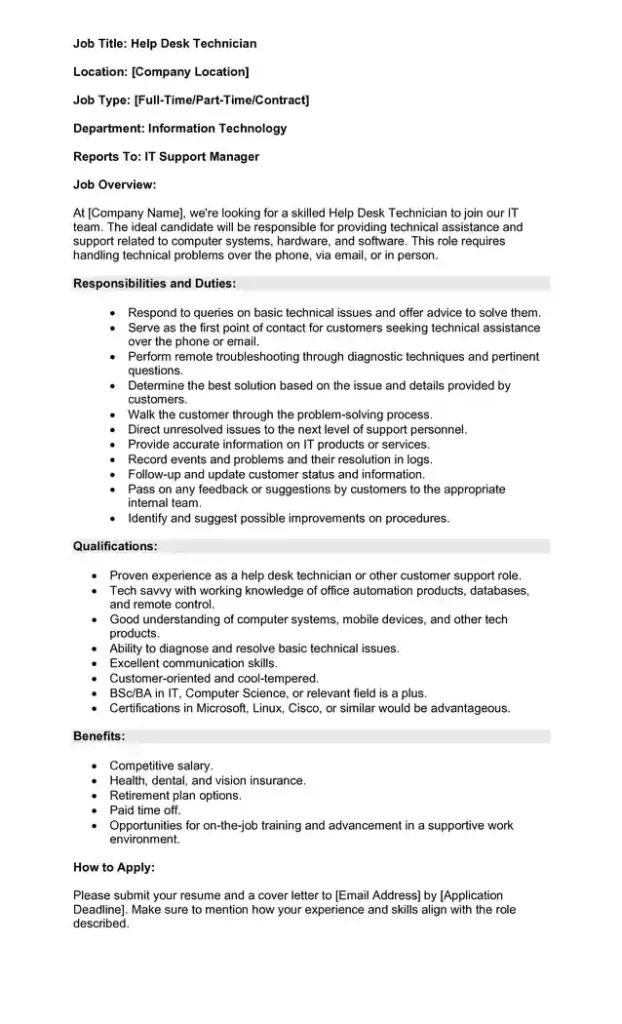
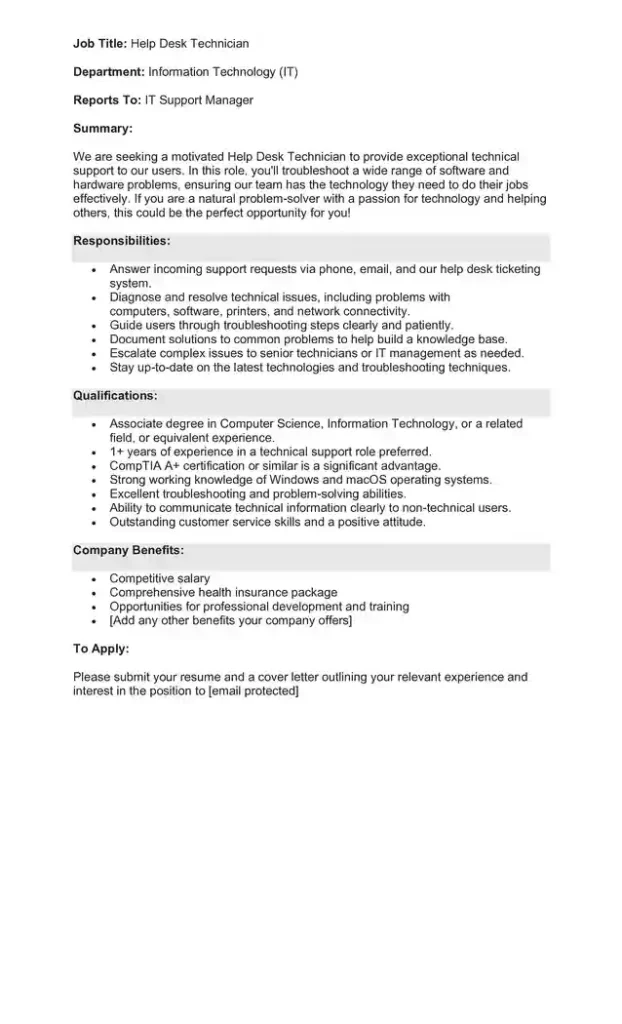
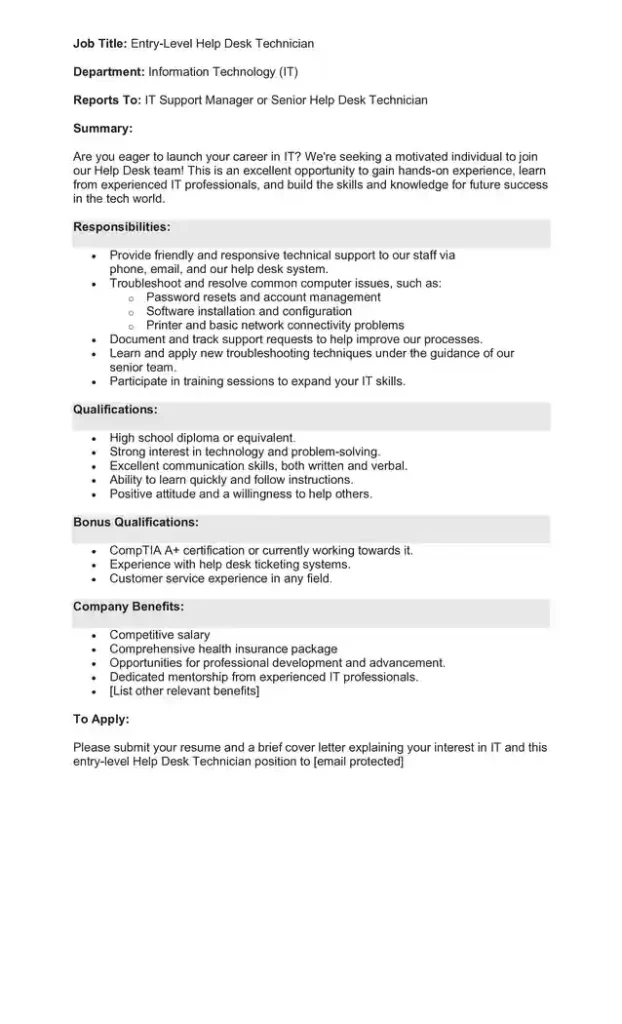
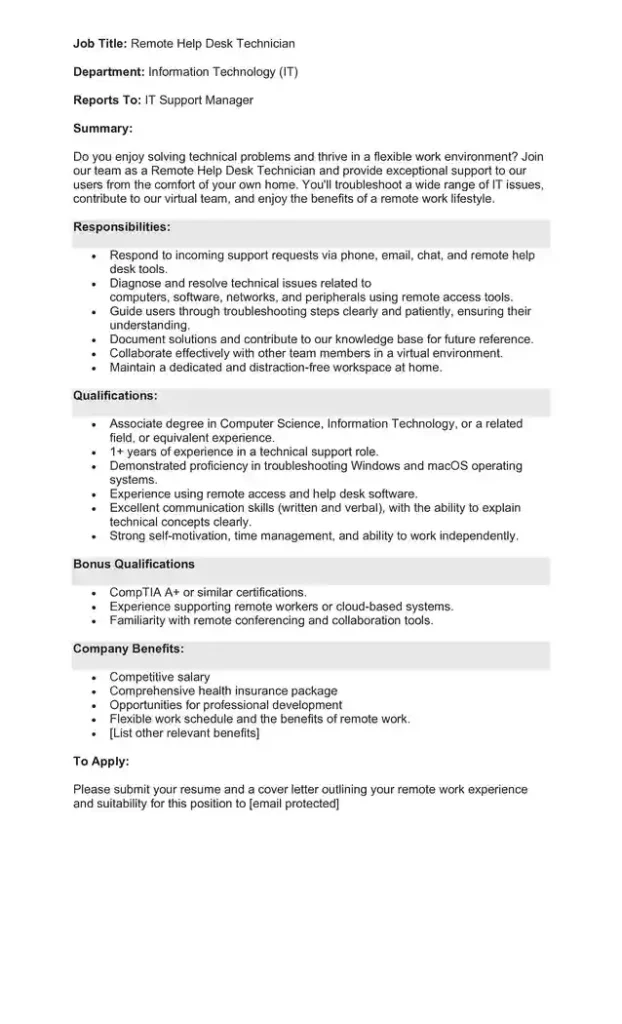
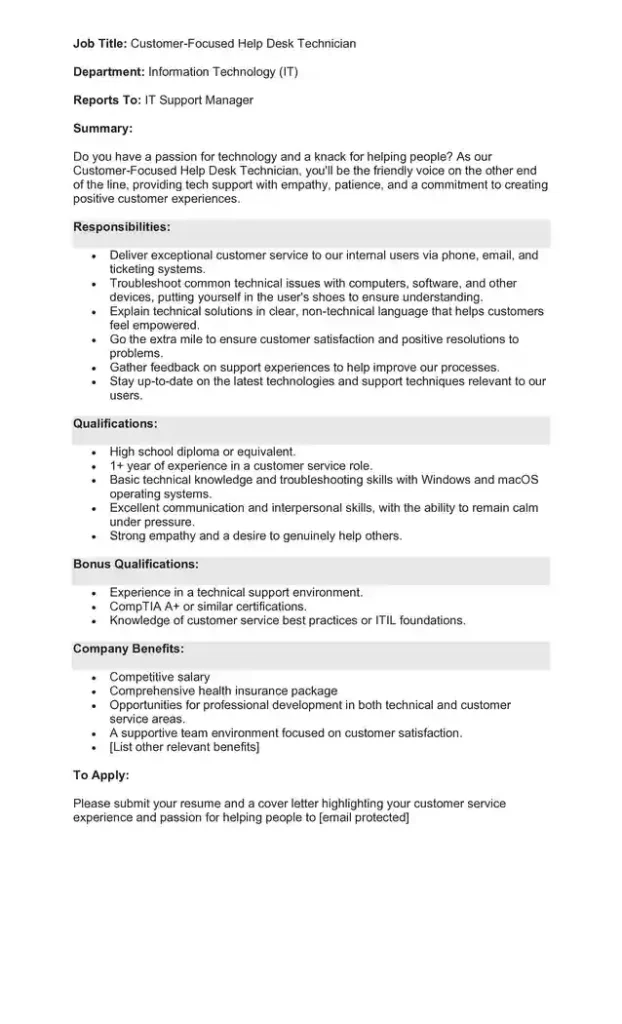
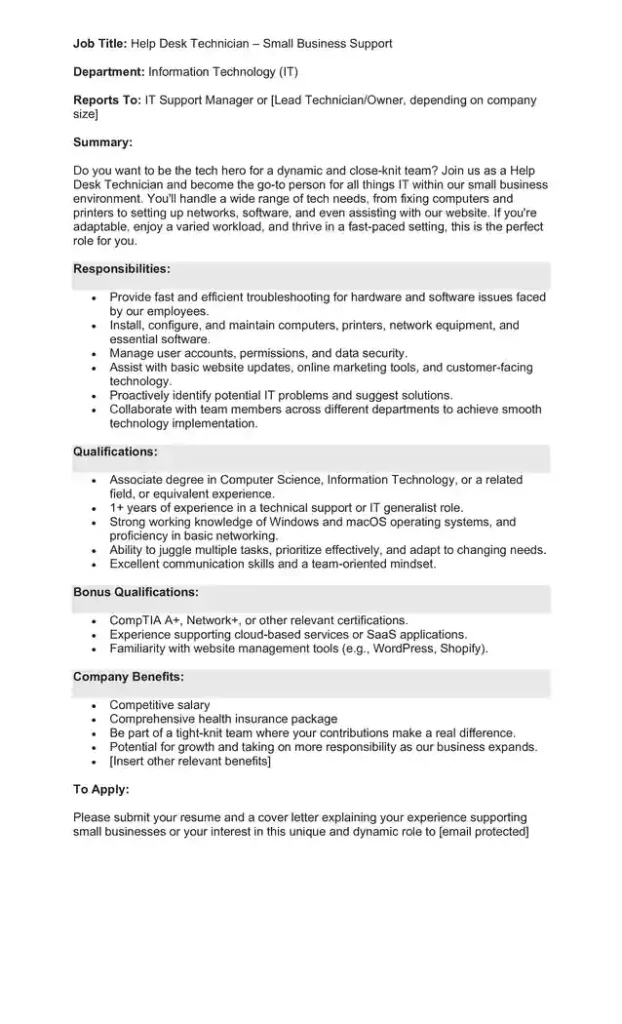
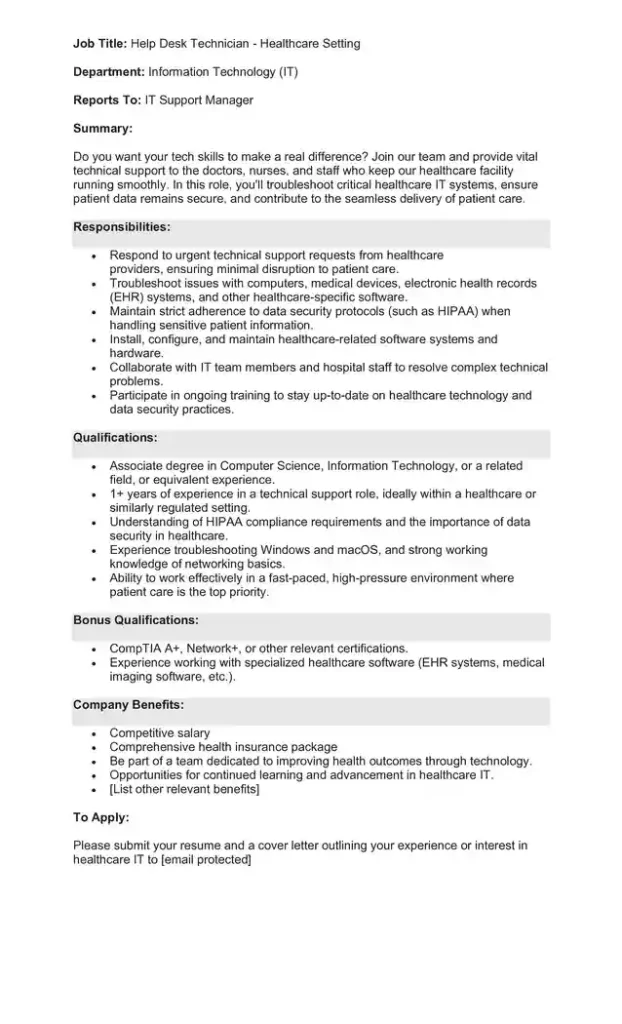
Conclusion
Job description for a help desk technician – If you’re a problem-solver with a passion for technology, a career as a Help Desk Technician could be your ideal path. Start exploring training programs and certifications today to launch your IT journey!

Alexander is a skilled HR expert who writes clear and compelling job descriptions. He has spent over 15 years in the HR field, helping companies find and keep the best employees. With a degree in Human Resources Management from the University of Chicago, he has the knowledge to back up his experience.







